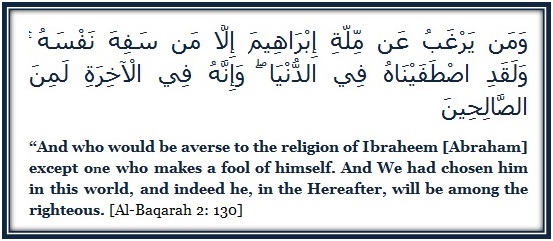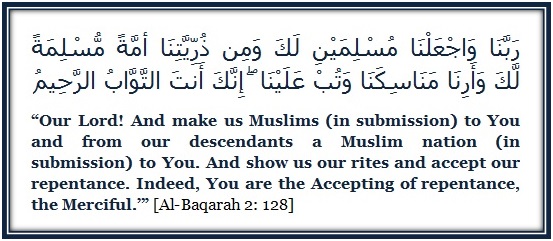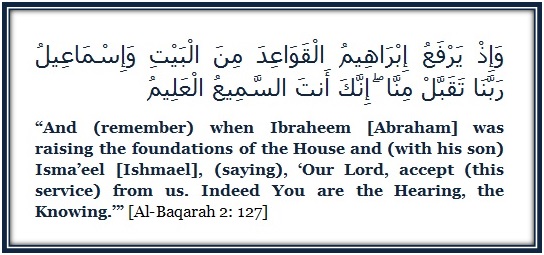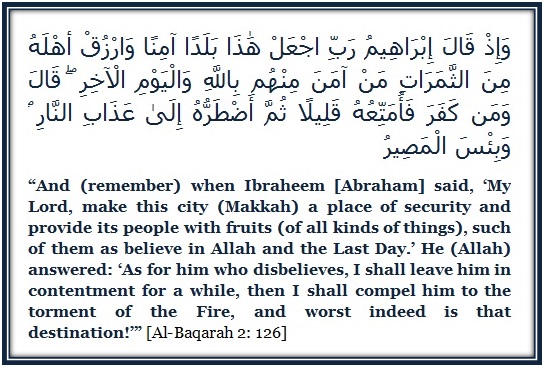Man chooses for His Offspring what He likes for Himself
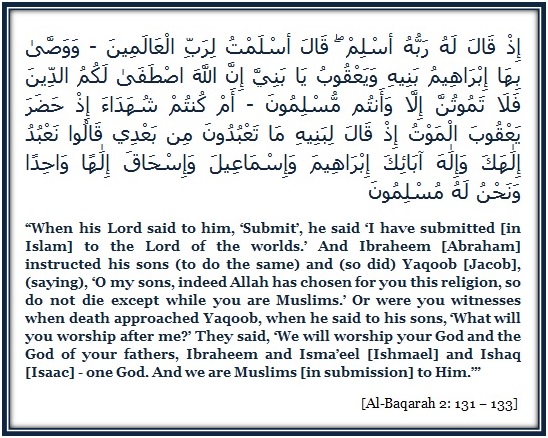 |
| Surah Baqarah Verse 133-133 |
When Allah subhanahu wa ta’ala commanded Ibraheem ‘alayhi salaam to be sincere with Him and to abide and submit to Him, Prophet Ibraheem perfectly adhered to Allah’s command. This defines his perfect submission and servitude to his Lord. This is what being a Muslim is – to submit one’s self to Allah subhanahu wa ta’ala.
The word aslim [أَسْلِمْ] is from the root seen-laam-meem. This is the same root from which Islam is derived which means to obey, submit oneself or to surrender one’s will.
Notice that in reply to Allah’s command, Ibraheem ‘alayhi salaam does not say, “I submit myself to You.” Rather, he says, “I have submitted to the Lord of the worlds.” He acknowledges the status and position of Allah subhanahu wa ta’ala that he is not submitting to someone ordinary but it is the Lord of all that there is. Ibraheem’s choice of words expresses his respectfulness and etiquette of speaking with Allah subhanahu wa ta’ala. In our prayers, do we ever realize Who we are standing before? How negligent are we!
His reply also carries recognition of the fact that in submitting himself to the Lord of the worlds he was only performing the essential duty of a servant towards the Master of All, and doing it for his own benefit.
Lesson:
This ayah teaches us that Islam was the common religion at the time of all the prophets. It is only after people went astray that differences occurred and people labeled themselves with other names.
Ayah 132
Not only did Ibraheem ‘alayhi salaam submit himself to Allah subhanahu wa ta’ala, but he commanded his children to do the same, “And Ibraheem instructed his sons (to do the same).” His (Ibraheem’s) children preserved the advice and did not keep it to themselves but passed it on to their children. Prophet Yaqoob [Jacob said, “‘O my sons, indeed Allah has chosen for you this religion, so do not die except while you are Muslims.’”
The word wassa [وَصَّىٰ] is from the root wau-saad-ya and it means ‘to bequeath, to recommend, to order or to command with wise counsel’.
Lessons:
Man chooses for his offspring what he loves for himself. Are our children on Islam? Is Islam and what pleases Allah subhanahu wa ta’ala the most important thing in our lives? If we don’t love Allah subhanahu wa ta’ala and obey Him then what do we expect from our children? If we do not choose Islam for our children today, then how will the entire family be united in Paradise, tomorrow?
In the Qur’an, we have been instructed, “O you who believe! Protect yourselves and your families from Fire,” [At-Tahreem 66:6]. It means we should not be content with ourselves being on the Right Path but we should call our loved ones and support them on this path too. The Prophet salAllahu ‘alayhi wa sallam started his da’wah from his family and closed friends. We read in the Qur’an, “And warn your closest kindred,” [As-Shu’ara 26: 214] and, “And enjoin As-Salat [the prayer] on your family, and be patient in offering them (i.e. the prayers),” [Ta-Ha 20: 132].
The servant of Allah, at the time of his death, is worried about his and his children’s relationship with Allah subhanahu wa ta’ala. On the contrary, he who is the slave of this world is concerned about this world. In his last moments, instead of worrying about his meeting with Allah subhanahu wa ta’ala he is talking about wealth and property. From the previous ayaat, we learn that the prophets loved their children and supplicated for their sustenance and well-being. However, when it was time to leave this world they did not give any instruction about food or wealth, rather the only thing that they advised them about was their emaan [faith]. This practice of the prophets provides a special guidance to the parents: just as they are keen to secure the worldly comfort and happiness of their children, they should pay equal, if not greater, attention to their emaan [faith] and righteous deeds that are according to the Shari’ah. Mufti Muhammad Shafi Usmani asks, “Is it at all reasonable that one should strain every nerve to protect one’s children from the heat of the sun, but leave them exposed to the fire of Hell?”
One can observe for oneself that if the close relations or the members of his family do not support a man in what he wishes to teach, or do not seem to be acting upon it, his teachings do not succeed so well with others. When the Prophet salAllahu ‘alayhi wa sallam took upon himself the prophetic function, the usual reply of his listeners was that he should first convince his own clan, the Quraysh, before turning to others. When his clan accepted Islam and after the conquest of Makkah, the world saw people entering Allah’s religion in throngs (see An-Nasr 110: 2).
Mufti Muhammad Shafi Usmani writes that the main reason for the ignorance and the indifference towards Islam spread wide among the Muslims today is that even when the parents themselves are good Muslims, they leave their children to themselves. They let the social environment mould them in its own fashion. Their only worry is to see their children doing well in this world, and they never think of what will happen to them in the next. Let us pray that Allah subhanahu wa ta’ala, in His mercy, grants all of us the solicitude for the other world, and helps us to make a genuine effort for faith and rectitude, ameen.
Both Ibraheem and Yaqoob ‘alayhi salaam instructed their children to follow the true religion. Allah subhanahu wa ta’ala elaborates this religion in Surah Aal-Imran,
“Truly, the religion with Allah is Islam…” (3: 19)
“And whoever seeks a religion other than Islam as religion, it will never be accepted of him, and in the Hereafter will be one of the losers.” (3: 85)
The distinction of being called Muslims has passed on to the Ummah of Prophet Muhammad salAllahu ‘alayhi wa sallam as we read in the Qur’an, “Be steadfast in the religion of your father, Ibraheem. He named you Muslims before this as well as in this (the Qur’an).” [Al-Hajj 22:78]
Adhering to Tawheed until Death
This ayah contains Allah’s criticism of the Arab pagans as well as the disbelievers among the Children of Israel, for each claimed to be on the religion of Ibraheem ‘alayhi salaam. The Jews claimed that Prophet Yaqoob advised them to remain Jews, Allah subhanahu wa ta’ala asks if they were witnesses when death approached him.
When death came to Yaqoob [Jacob] ‘alayhi salaam, he advised his children to worship Allah subhanahu wa ta’ala alone without partners. He said, “‘What will you worship after me?’ They said, ‘We shall worship your Ilah [God – Allah] the Ilah of your fathers, Ibraheem, Isma’eel, Ishaq…’”
{Mentioning Isma’eel here is a figure of speech, because Isma’eel ‘alayhi salaam is Yaqoob’s [Jacob’s] uncle; the Arabs call the uncle a father.}
We find similar instruction in the Bible. In Thalmud it appears that Jacob said:
“Serve the Lord your God, and He will deliver you from all trouble, even as He delivered your fathers…Teach your children to love God, and observe His commandments, in order that their days may be prolonged, for God will guard those who do justly and walk in righteousness through all His ways.”
His sons replied, “All that you have commanded us, our father, we will do. May God be with us.”
Prophet Jacob said, “The Lord will be with you if you depart not from His ways to the right hand or to the left.”
[Thalmud, Chapter VI, Death of Jacob and His Sons]
The statement, “One Ilah [إِلَـهًا وَاحِدًا]” means we single Him out in divinity and do not associate anything or anyone with Him. It is to Him that we submit in obedience.
What complete surrender and submission requires is that one should put his desires and inclination aside, and seek the pleasure of Allah subhanahu wa ta’ala in everything that he does. If he goes to work, his goal should not be minting money but providing himself and his family lawful sustenance. One can attain the pleasure of Allah subhanahu wa ta’ala only when he knows His commands – His permissions and His prohibitions. This is what real ‘ibadah [worship] is.
Indeed, Islam is the religion of all the prophets, even if their respective laws differed. Allah subhanahu wa ta’ala said,
وَمَآ أَرْسَلْنَا مِن قَبْلِكَ مِن رَّسُولٍ إِلاَّ نُوحِى إِلَيْهِ أَنَّهُ لا إِلَـهَ إِلاَّ أَنَاْ فَاعْبُدُونِ
“And We did not send any Messenger before you (O Muhammad) but We revealed to him (saying): La ilaha illa Ana [none has the right to be worshiped but I (Allah)], so worship Me (alone and none else).” [Al-Anbiya 21:25]
There are many other ayaat and ahadeeth on this subject. For instance, the Prophet salAllahu ‘alayhi wa sallam said,
نَحْنُ مَعْشَرَ الْأَنْبِيَاءِ أَوْلَادُ عَلَّاتٍ دِينُنا وَاحِد
“We, the Prophets, are brothers with different mothers, but the same religion.”
Before concluding this ayah, let us clarify an important point. Ibraheem ‘alayhi salaam made his descendants promise that before they died they should make sure that they had been Muslims.
It means that one should steadfastly follow the teachings of Islam throughout one’s life, so that one receives the grace of Allah subhanahu wa ta’ala and remains a Muslim until his last breath. The ahadeeth teach us that a person will die in the state he has lived his life, and will be resurrected in the same state on the Day of Judgment. It means that if a person was conscious of Allah subhanahu wa ta’ala in all areas of his life, Allah subhanahu wa ta’ala will protect him and allow him a good end. On the other hand, if a person never cared about Allah’s pleasure or distinguished between right and wrong, then such a person will not have a good end unless he repents.
Lesson:
We learn the virtue of performing righteous deeds during our lifetime and remaining on this path, so that Allah subhanahu wa ta’ala will endow us with the favor of dying upon it. Allah subhanahu wa ta’ala helps those who seek to do good deeds to remain on the righteous path.
We ask Allah subhanahu wa ta’ala for a good end and a life that is according to the Qur’an and Sunnah. Allahumma ameen.


